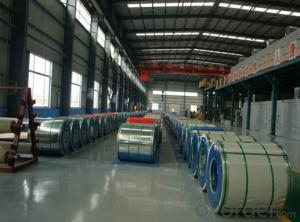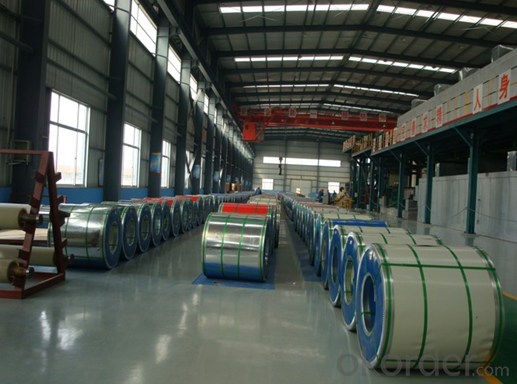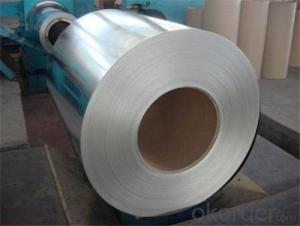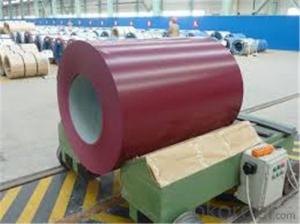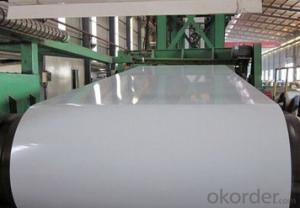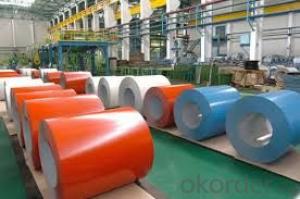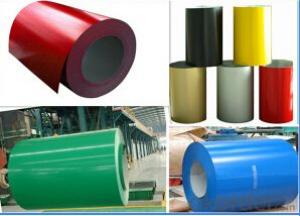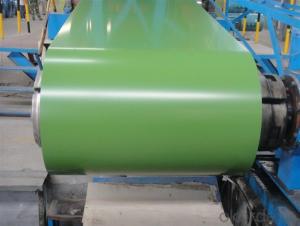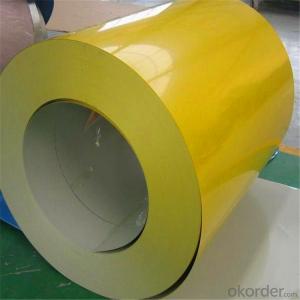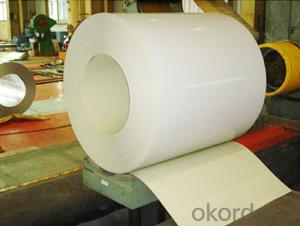Pre-Painted Galvanized Steel Roofing Sheet PPGI/PPGI
- Loading Port:
- China main port
- Payment Terms:
- TT OR LC
- Min Order Qty:
- 25 m.t.
- Supply Capability:
- 100000 m.t./month
OKorder Service Pledge
OKorder Financial Service
You Might Also Like
Product Description
Product | Galvanized | PPGI | Contour plate
| Camouflage plate | |
Certificate | ISO9001,ISO14001 | ||||
Standard | ASTM A526 JIS G3302 | ASTM A525 JIS G3312/3322 | - - | - - | |
Gade | CGCC/CGLCC CGCH/CGLCH CGC340-570 CGLC400-570 | SGCC/CS/DX51D SGCH | - - - - | - - - - | |
Model | Thick:0.11-1.0mm Width:600-1250mm | Thick:0.14-3.5mm Width:600-1250mm | Thick:0.14-3.0mm Width:600-1250mm | Thick:0.14-3.5mm Width:600-1250mm | |
Type | Roil/Coil Sheet/Plate Corrugated Sheet | Roil/Coil Sheet/Plate Corrugated Sheet |
Corrugated Sheet | Roil/Coil Sheet/Plate Corrugated Sheet | |
Coil Weight | 3-8t | ||||
Surface Finish | Regular Spangle | Pre-painted | Pre-painted | Pre-painted | |
Application | Roofing,Structural,Commercial use,Household Applicnce,Industry,Others | ||||
Special Application
| Wear resdentant steel,High-strength-steel plate | ||||
Name | GI / GL / PPGI / PPGL |
Full name | Galvanized ,Galvalume,Pre-paited galvanizing,Pre-paited galvalume |
Basic material | Cold Roll |
Color of the PPGI and PPGL | Any color in RAL |
Standard | AISI, ASTM, BS, DIN, GB, JIS |
Spangle | Normal / Min / Zero |
Brand Name | |
Thickness | 0.6mm |
Width | 600mm to 1250mm |
Length | According to customers |
Surface Treatment | Hop-dipped Galvanized |
AZ coating | 50-275g/m2 |
Spangle | Normal/Min/Zero |
Minimum order | 25 Metric Tons |
Place of Origin | Shandong, China(Mainland) |
Packing | Fully Applicable for exporting seaworthy packing of horizontal type on wooden skids |
Price terms | FOB Qingdao |
Terms of payment | T/T, L/C or T/T and L/C |
Delivery Detail | within 7-25 days after receiving pre-payment (as per the order quantity) |
Coil ID | 508mm/610mm |
Coil Weight | 3-5 tons |
Supply Ability |
|
Application | Construction Structure, roofing, commercial use, household appliance, industry- |
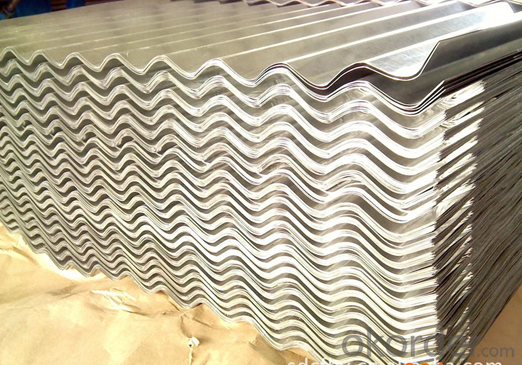
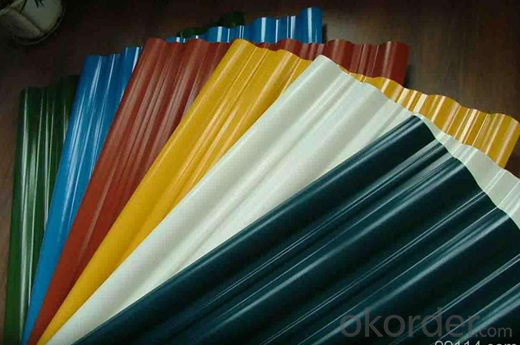
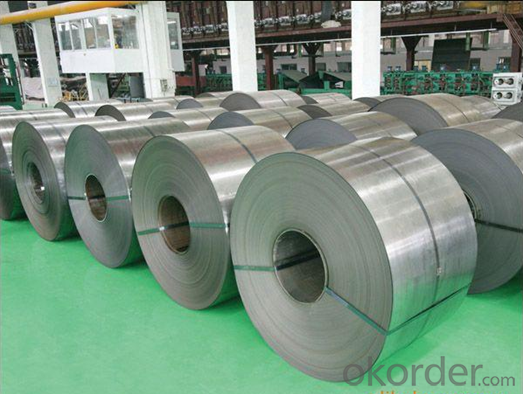
FAQ
1. What's your normal delivery time?
Our delivery time about 10-20days for standard sizes, if you have other requirements like hardness and width ,it is about 20-40days. But don't worry ,we also try our best for the delivery time ,because time longer and our cost is higher.
2.Are the products tested before shipping?
Yes, all of our PPGI and GI was qualified before shipping. We test every batch every day.
3. Is the sample available?
Yes, samples can be sent for test if you need.
- Q: I am a beginner (never played before!) and I am going to try to teach myself since I think it is a lovely instrument. I am fourteen-years-old so I am not 'adult-size', haha. Anyway, what is difference between nylon strings and steel strings?Thanks :)
- Small guitars easier to find in classical range. I assume their must be small steel strings but not seen them.
- Q: How are steel coils inspected for hardness?
- Steel coils are inspected for hardness using a non-destructive testing method called Rockwell hardness testing. This involves pressing a diamond or ball indenter into the surface of the coil and measuring the depth of the indentation. The hardness value is then determined based on the depth of the indentation, providing an accurate assessment of the coil's hardness.
- Q: What are the challenges in coil slitting for thin gauge materials?
- Successfully operating coil slitting for thin gauge materials involves addressing a specific set of challenges. One major challenge is ensuring the proper handling and stability of the thin gauge material. The material's susceptibility to deformation, wrinkling, or tearing increases as it becomes thinner. To tackle this, careful attention must be given to the handling equipment and techniques used during the slitting process. This is necessary to maintain the appropriate tension and support throughout the operation. Another challenge is maintaining consistent and precise slitting widths. Thin gauge materials are often used in applications where accuracy is crucial, such as electronic components or automotive parts. Any variation in the slitting width can cause functional defects or assembly problems. Achieving precise slitting widths in thin gauge materials requires the use of high-quality slitting knives, well-maintained slitting machinery, and accurate tension control systems. In addition, thin gauge materials are more prone to surface defects, such as scratches or burrs, during the slitting process. These defects can impact the material's appearance, performance, or even its safety. To minimize the occurrence of surface defects, it is important to carefully select slitting knives and regularly maintain the slitting machinery. Furthermore, thin gauge materials often possess a higher yield strength, making them more resistant to deformation. This poses a challenge when it comes to achieving clean and straight edges during the slitting process. Special considerations must be taken to ensure that the slitting knives are sharp and properly aligned, allowing for clean cuts without introducing any edge defects. Lastly, thin gauge materials are generally more sensitive to external factors such as temperature, humidity, or static electricity. These factors can affect the material's dimensional stability, resulting in variations in slitting width or other quality issues. Therefore, it is crucial to establish appropriate environmental conditions and implement effective anti-static measures to minimize the impact of these factors. To summarize, the challenges associated with coil slitting for thin gauge materials revolve around handling and stability, maintaining precise slitting widths, minimizing surface defects, achieving clean and straight edges, and mitigating the influence of external factors. Overcoming these challenges requires a combination of suitable equipment, techniques, and operational controls to ensure high-quality slitting outcomes.
- Q: Can steel coils be welded?
- Yes, steel coils can be welded. Welding is a common method used to join steel coils together or to other steel components, allowing for the formation of strong and durable connections in various applications.
- Q: How are steel coils used in the shipbuilding industry?
- Steel coils are used in the shipbuilding industry primarily for the construction of ship hulls, decks, and other structural components. These coils are typically processed and shaped into plates, beams, and other forms to provide strength and stability to the ship's structure. The high tensile strength and durability of steel make it an ideal material for shipbuilding, ensuring the vessel's ability to withstand harsh marine environments and heavy loads.
- Q: How are steel coils used in the production of HVAC systems?
- Steel coils are used in the production of HVAC systems as a key component in the heat exchange process. They are typically used in the condenser and evaporator coils to transfer heat between the refrigerant and the air. The steel coils provide a durable and efficient surface for heat transfer, ensuring the HVAC system can effectively cool or heat the air.
- Q: How are steel coils used in the manufacturing of industrial mixers?
- Steel coils are used in the manufacturing of industrial mixers as they provide a strong and durable structure for the mixer body. The coils are shaped and welded to create the necessary components, such as the mixing chamber and blade supports. This ensures that the mixer can withstand the high forces and vibrations involved in mixing large quantities of materials in industrial applications.
- Q: Can steel coils be embossed?
- Yes, steel coils can be embossed. Embossing is a process that involves creating raised or sunken designs on a material, and it can be applied to steel coils to add texture or decorative patterns.
- Q: How are steel coils used in the manufacturing of suspension systems?
- Steel coils are used in the manufacturing of suspension systems as they provide the necessary support and cushioning for vehicles. These coils, also known as coil springs, are placed between the vehicle's chassis and the wheels to absorb impact and ensure a smooth ride. The steel coils are designed to compress and expand under the weight and movement of the vehicle, effectively absorbing shocks, vibrations, and uneven road surfaces. This helps to improve stability, handling, and overall comfort for the driver and passengers.
- Q: What are the common sizes of steel coils?
- The specific needs and requirements of different industries determine the variations in common sizes of steel coils. However, the steel manufacturing and processing sectors commonly utilize standard sizes. These sizes include: 1. Slit Coils: Typically smaller, slit coils are readily available in widths ranging from 0.5 inches to 72 inches. The weight of slit coils varies, usually falling between 1000 pounds and 50,000 pounds. 2. Master Coils: Larger in size, master coils are generally utilized in steel processing facilities for the production of different steel products. The width of master coils commonly ranges from 36 inches to 96 inches, while the weight may vary from 5,000 pounds to 60,000 pounds. 3. Sheet Coils: Construction, automotive, and appliance manufacturing industries often employ sheet coils. The standard sizes for sheet coils vary, but they are commonly found in widths of 48 inches, 60 inches, and 72 inches, with lengths ranging from 96 inches to 240 inches. 4. Plate Coils: Primarily utilized in heavy-duty applications such as shipbuilding, bridge construction, and pressure vessel manufacturing, plate coils tend to be larger in size. Their widths typically range from 36 inches to 96 inches, while lengths vary from 96 inches to 480 inches. It is important to note that these sizes are not fixed and can be customized according to specific customer requirements. Steel manufacturers and suppliers possess the capability to produce coils in various sizes to cater to the diverse needs of their clients.
Send your message to us
Pre-Painted Galvanized Steel Roofing Sheet PPGI/PPGI
- Loading Port:
- China main port
- Payment Terms:
- TT OR LC
- Min Order Qty:
- 25 m.t.
- Supply Capability:
- 100000 m.t./month
OKorder Service Pledge
OKorder Financial Service
Similar products
Hot products
Hot Searches
Related keywords
